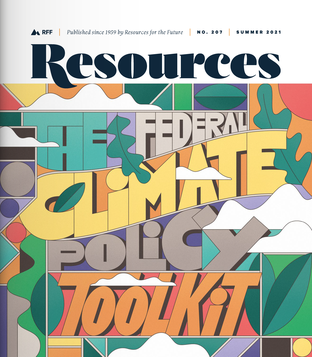
Summer 2021 / Magazine Issues
Issue 207: The Federal Climate Policy Toolkit
A Note from RFF’s President about Resources issue 207:
At Resources for the Future (RFF), we use economic insight to help improve environmental, energy, and natural resource decisions. A critical effort in this mission is to halt climate change and mitigate its impacts, including decarbonization of the global economy.
In the United States, we’ve found ourselves at a pivotal moment when decarbonization efforts are being taken seriously and pursued ambitiously. From corporate board rooms and the halls of Congress to the White House and state agencies, emissions reduction goals and strategies are being developed and vetted. These plans will touch every corner of the economy. This moment brings tremendous opportunity—and responsibility—to design policies that both meet climate goals and underpin a thriving and equitable economic future. Hence, the issue of Resources you now hold in your hands (or view on your screen).
It’s important to move both quickly and wisely in times of great change, with input from wide-ranging stakeholder communities and impartial data driving decisions. In this spirit, RFF has compiled a comprehensive collection of policy options for decarbonizing the US economy. The articles here summarize thousands of collective hours of research and analysis by RFF experts on this topic. We hope this “Federal Climate Policy Toolkit” can help lead the way to net-zero emissions as the federal government takes action on climate change.
The articles in this issue of Resources describe policy options for decarbonizing all major sectors of the economy and have been assembled from our Federal Climate Policy Toolkit explainer series, available at rff.org/toolkit. I wrote the first article as a summary of the primary policy instruments that the federal government can employ to reduce emissions; the article also describes how we can combine policies to reach climate goals most effectively, efficiently, and equitably. The subsequent articles get more specific: economy-wide policies; the power sector; the transportation sector; the industrial sector; the buildings sector; land use, forestry, and agriculture; and the oil and gas industry. We also hear from RFF Board Member C. Boyden Gray about the value of impartial economic research.
We hope this magazine—along with related materials on rff.org and resources.org—can serve as a reference for decisionmakers and staff in Congress, the administration, you, and your colleagues as we all work together to scale back emissions and help support a healthy environment and thriving economy. I look forward to collaborating with you.
Richard G. Newell
President and CEO, Resources for the Future
Articles in this issue
Federal Climate Policy Toolkit: Reducing Emissions

US Greenhouse Gas Emissions by Sector

Federal Climate Policy Toolkit: Economy-Wide Policies

Federal Climate Policy Toolkit: Power Sector

Federal Climate Policy Toolkit: Transportation

Federal Climate Policy Toolkit: Industrial Sector

Federal Climate Policy Toolkit: Buildings

Federal Climate Policy Toolkit: Land Use, Forestry, and Agriculture

Federal Climate Policy Toolkit: Oil and Gas

Supporter Spotlight: Combating Climate Change with Fair Analysis
